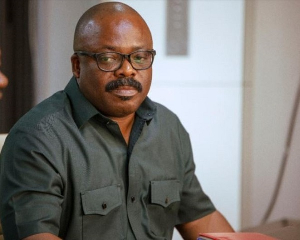Ho, June 24, GNA - The National Commission for Civic Education (NCCE) has provided empirical evidence to attest to corruption in the judicial system and condemned the hauling of some lawyers before the General Legal Council for asserting judicial corruption.
"The testament of 23 judges; 134 lawyers; 122 judicial staff; and 150 litigants from the Greater Accra and Ashanti Regions captured in the Judicial Corruption Monitoring Exercise in Ghana on the subject affirmed the existence of corruption in the judicial system. "Based on this, I have no doubt in my mind that corruption in the judiciary is real and could not be considered as a perception anymore," Mr Harrison Kofi Belley, Volta Regional Director of the NCCE stated at Ho on Thursday to set the stage for the region's 2011 Constitution Week roundtable discussion on the issue. Mr Belley therefore queried the basis for dragging the gentlemen before the Legal Council=85"Why are we behaving like the ostrich? These gentlemen should not be used as scapegoats because they are only re-echoing a phenomenon that everyone is already aware of". He said the Ghana Integrity Initiative's (GII) report based on a survey conducted by students from the Faculties of Law at Kwame Nkrumah University of Science and Technology and University of Ghana provides empirical evidence for concluding that corruption in the judicial system is no longer a perception.
He said other evidence could be deduced from the Corruption Perception Index (CPI) and the Ghana Centre for Democratic Development (CDD-Ghana) and Amnesty International's annual report which consistently identified corruption as a serious problem in Ghana. The NCCE Regional Director therefore urged the judiciary not to create the impression that they are trying to gag lawyers and other ordinary outspoken Ghanaians from commenting on the judicial systems. "I challenge the judiciary to draw on the knowledge and experiences of judiciaries worldwide and the integrity of best practices and benchmarks of other institutions to enhance its image," he said. Mr Belley assured panelists and participants who appeared on NCCE organized programmes to openly discuss and contribute boldly on topics under consideration without any fear of being intimidated by anybody, as 93the NCCE's mandate involves dealing with matters concerning the rights and duties of the citizen and indeed all matters concerning constitutionalism and nation-building. "The NCCE is entrenched in the 1992 Constitution by Article 231. Parliament, in line with constitutional demands, enacted within six months of coming into force of the Constitution, the law setting up the NCCE under Act 452.
"By this mandate, the NCCE is expected to mount educational programmes not only to inculcate into the citizens the ideals of patriotisms and good citizenship but also to stimulate the citizens to appreciate the supremacy of the Constitution as the basic law of the land".
Mrs. Augustina Akosuah Akumanyi, a Deputy Chairman of the NCCE, called on all Ghanaians to join the crusade against corruption as it is the bane of the country's underdevelopment. She also urged parents, teachers, religious leaders, civil activists, traditional and opinion leaders to serve as role models of to the younger generation, saying 93we must build the next generation base= d on sound moral aptitude".
Most participants called on the media and the Information Services Department to jointly intensify moral education and highlight the debilitating effects of corruption on the nation daily. The roundtable discussion forms part of this year's annual National Constitution Week celebration organized by the NCCE in collaboration with the National Organising Committee (NOC). Constitution Week 2011 is on the general theme: 93The State of Ghana's Democracy 2011" and focuses on five sub-thematic areas 96 The Judicial and Justice System, Political Parties, Corruption, Decentralisation and the Media.
General News of Friday, 24 June 2011
Source: GNA












